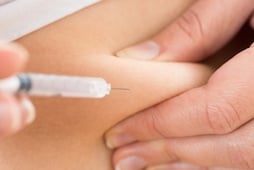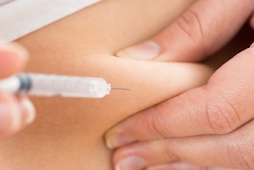
 I have by now answered several questions from readers who tell me they have a positive pregnancy test. They will often give me their pregnancy test result and ask me if the level is okay. On further enquiry, I often find out (and am furious) that these patients have been taking booster human chorionic gonadotropin (hCG) injections after the egg retrieval (luteal phase)! These injections result in a false positive pregnancy test since the patients are taking the same hormone (hCG) that the pregnancy test detects. This fools patients into thinking that they were pregnant when they really are not.
I have by now answered several questions from readers who tell me they have a positive pregnancy test. They will often give me their pregnancy test result and ask me if the level is okay. On further enquiry, I often find out (and am furious) that these patients have been taking booster human chorionic gonadotropin (hCG) injections after the egg retrieval (luteal phase)! These injections result in a false positive pregnancy test since the patients are taking the same hormone (hCG) that the pregnancy test detects. This fools patients into thinking that they were pregnant when they really are not.
At InVia Fertility Specialists, we will start patients on progesterone supplementation the day after egg retrieval. This is usually in the form of vaginal gel (Crinone 8%), vaginal tablets (Endometrin) or progesterone-in-oil injections. Some programs will add estrogen in the form of oral tablets or skin patches. So, a fair question would be, why?
Progesterone is a hormone that is necessary for implantation and pregnancy.
During IVF, ovarian stimulation is carried out using gonadotropins (follicle stimulating hormone (FSH), human menopausal gonadotropin (hMG)). To prevent premature ovulation, we often add gonadotropin releasing hormone (GnRH) agonists (e.g. leuprolide acetate (Lupron)) or GnRH-antagonists (e.g. Ganirelix, Cetrorelix) into ovarian stimulation regimens. These have been shown to be associated with improved outcomes after IVF and other assisted reproduction technologies (ART). These also interfere with the ability of the ovary (corpus luteum) to release progesterone.
Pituitary function does not resume completely until 2–3 weeks after the end of GnRH-agonist therapy. Also the process of egg retrieval necessitates the puncturing of follicles with a needle and this could disrupt the ability of the corpus luteum to release progesterone. It is for these reasons that we usually supplement the period after egg retrieval (luteal phase) with progesterone and sometimes estrogen. Over the years, it became clear that luteal phase support had a positive effect on outcome. Other studies have shown a significantly lower pregnancy rate when progesterone is NOT used.
Another agent that be given to supplement the luteal phase is human chorionic gonadotropin (hCG). Yes, the same hCG, which is used as a trigger shot (Profasi, Ovidrel etc) can also be used to stimulate the corpus luteum to release progesterone. The pregnancy rates with these hCG booster shots are comparable to those achieved with progesterone.
The problem with hCG booster shots is that they increase the risk of ovarian hyperstimulation syndrome (OHSS). OHSS is a potentially serious complication with ovarian stimulation and is to be avoided as much as possible.
I don’t know. I would like to believe they do so out of ignorance of the down side.
I, however, suspect there may be another reason.
hCG booster injections will result in a (false) positive pregnancy test! They can be used to fool patients into believing that they are pregnant when they are not. Subsequently, when the patient gets a period, she is told that she has “miscarried.” Terrible!
So, if your physician has prescribed hCG booster shots after your egg retrieval, please be aware of the following: A first pregnancy test will NOT be able to accurately diagnose pregnancy. You will need follow up hCG levels, which will have to show appropriate rise or wait for an ultrasound (a couple of weeks later) to confirm pregnancy.
To see a fertility specialist who is a board-certified physician with excellent success rates, make an appointment at one of InVia’s four Chicago area fertility clinics.

Dr. Karande is Board Certified in the specialty of Obstetrics and Gynecology as well as the subspecialty of Reproductive Endocrinology and Infertility. He is a Fellow of the American College of Obstetricians and Gynecologists and Member of the American Society for Reproductive Medicine.
Subscribe to our weekly blog digest

Entire Website © 2003 - 2020
Karande and Associates d/b/a InVia
Fertility Specialists

Comments